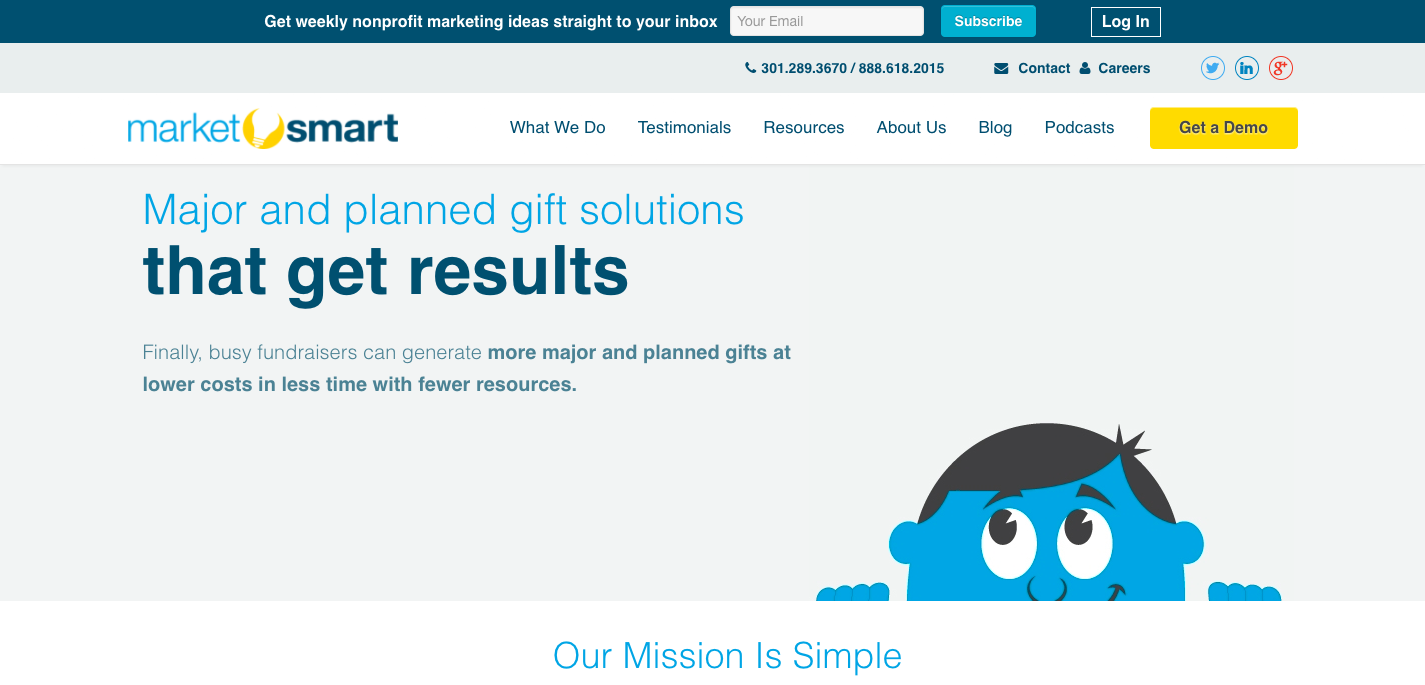I’ve worked in our industry for just about three years, and in that time I’ve learned a lot. I’m fortunate to have a long list of mentors (Claire, Greg, Pamela, Solomon, Brady, the list goes on and on) who have “shown me the ropes.” Thank you.
One thing you realize when you first begin your career in our sector is that nonprofits operate a bit differently than their for-profit counterparts . As a vendor, you get a unique perspective to witness this. Rather than being inside one organization, I get to ebb and flow through hundreds of organizations each year, popping in and popping out for hours at a time. I’ve been able to identify patterns and similarities across even the most distinctly different organizations.
Even more compelling is the fact that some of those patterns and similarities identified within nonprofits resonate back home with me here, at our for-profit company. Organizations of all shapes, sizes, and structure experience similar pain points, hardships and struggles. Go figure.
As a vendor it’s always interesting to reflect on the dynamic of our relationship with our clients. Vendors strive to make money — they’re for-profit companies — while the organizations they serve are nonprofit, and are not in it for the money, but rather to further their mission.
This creates an interesting dynamic.
You might not see it (thanks to savvy marketing), but vendors fight, vendors scrap, and vendors scrutinize their bottom line endlessly. Nonprofits fight (for their mission), nonprofits scrap (for their resources), and nonprofits scrutinize their bottom line (to make sure programs can be funded) endlessly too, but it’s a bit different.
From my perspective, as a vendor, I have been able to develop a fairly robust understanding of our industry. One thing above all else has stuck with me through the years, and that is the distinction (or lack thereof) between development and fundraising.
Vendors tend to sell products to “fundraisers,” when they really mean to be targeting development professionals. The two phrases, although different, appear to the naked eye to say the same thing. The reality is that they take on drastically different connotations.
There is a huge distinction and one that, as a sector we should strive to further validate. Let’s discuss the difference, the implications it has, and how vendors (much like myself) can help further the conversation and adapt the existing landscape.
Fundraiser vs. development
What’s in a word? An awful lot, actually. Words and their meanings play an incredibly important role in our society and, more significantly, in our communication with one another everyday. You didn’t need me to tell you that, you already knew it, but it’s a friendly reminder that the words we speak carry weight.
As with any industry or sector, we nonprofit professionals have our own dictionary of terms, acronyms, and jargon. I’ve written about that in the past, and I highly recommend you take a peek and contribute to the list, but for today we are going to get more into the weeds.
What is a fundraiser? From our good friends at Dictionary.com we know that a fundraiser is “a person who solicits contributions or pledges.” Simple enough and most likely inline with the definition most non-nonprofit professionals have too.
What is a development professional? That definition is harder to come by and there isn’t a Dictionary.com entry we can reference. Instead, let’s look to thought leaders. Campbell and Company has a bit of a long-winded definition:
“‘Development,’ on the other hand, encourages us to think about our work in ‘relational’ terms–the building, over time, of a continuous, powerful and life-long connection between a donor / philanthropist and the organization or cause we represent. When we approach our work as ‘development,’ the process includes extended cultivation, thorough education, and attentive stewardship — as well as appropriate solicitation!”
And Claire Axelrad of Clairification has an abbreviated definition rooted in the work of Kay Sprinkel Grace, “Development is ‘the process of uncovering shared values.’ It is about cultivating meaningful relationships and then providing opportunities for people to invest in areas that are important to them.”
When you compare and contrast the definitions of our two words (fundraiser and development professional), it is easy to see why most people outside of our sector refer to us as “fundraisers.” Fundraiser is easier and less abstract to comprehend .
This is a shame though, because both fundraisers and development professionals do more than simply solicit people for money. My time in this industry has shown me that nonprofit staff are some of the most resourceful, innovative, and dedicated professionals in the world. Suggesting that someone with the title of “fundraiser” simply asks other people for money is ludicrous.
This comes back to connotation. Internally, as a sector we agree that we are not fundraisers, we are development professionals. But externally, to our peers in program departments or our board of ex-industry titans, and most importantly to our donors, we are simply the people who ask for money. This connotation boxes us in, and vendors perpetuate this problem.
Fundraising and development are different. And, if I may add my own definition into the mix, a development professional can simply be defined as “a person who creates the systems and processes required for a nonprofit organization to sustain itself financially.” That’s it.
Yes, this definition encompasses raising funds, but it also speaks to the myriad projects and disparate existing systems you have to work with. Fundraisers ask for money. Development professionals create financially sustainable organizations. Fundraisers are development professionals. And development professionals are highly valued assets at any nonprofit organization.
Why the distinction?
At this point you might be thinking, “What got into this guys coffee this morning, why does he care so much?” It’s simple: I’ve seen the implication of being a fundraiser vs. being a development professional first hand.
Remember the introduction of this blog post, where I discussed the interesting perspective I get as a result of being a vendor? Yeah? Well, I’ve seen both ends of the spectrum, and one is the standard all nonprofit professionals should strive for.
Anecdotally, in my experience, a fundraiser is perceived lesser than a development professional. I’ve been to a variety of conferences where the conversation relates to developing a “culture of philanthropy,” and each time I think to myself, “Don’t refer to your fundraising staff as well, fundraising staff, shift the cultural mindset away from ‘transactional solicitation,’ and towards development — building systems and processes for financial growth.” Unfortunately, I haven’t been invited to speak at any of these events, and I may never will, but this is the distinction I strive to highlight.
Even as a point of career advancement, we should take great effort to have our peers understand that as a development professional we do much more than ask people for money. [inlinetweeet]When other staff and leadership comprehend the full scope of the roles and responsibilities you take on, you have a greater chance at getting a raise, or being identified for a promotion[/inlinetweeet]. I’ve witnessed this happen firsthand.
Again, this is all anecdotal, and my experience as a vendor jumping in and out of organizations for hours at a time has it’s pros and cons, but never the less, this is what three years in our sector has shown me. These experiences are what inspires blog posts like the one you are currently reading, and, more importantly, gradual changes vendors make in the space. Speaking of vendors…
Perpetuating the problem
In a lot of industries the outside vendors who provide resources to the sector play a large role in how things get done. Vendors supply data, services, and solutions. And, the quality of those offerings directly relates to how efficiently and effectively an organization can operate.
This blog post is not an attempt to be an indictment on how vendors could (and should) do a better job providing solutions to their clients, but rather a focus on how vendors market their solutions in such a way as to further our fundraiser vs. development professional divide.
Take a look at the homepage for MarketSmart, the parent company of Fundraising Report Card®, and my current employer.
Do you see the language, “Finally, busy fundraisers can generate more major and planned gifts at lower costs in less time with fewer resources.”?
I’m petitioning internally to remove that. We aren’t helping busy fundraisers, we are helping busy development professionals. There’s a difference! Vendors, board members, anyone who isn’t a true nonprofit professional doesn’t get the difference and that’s a problem.
Here at MarketSmart I am preaching the importance of understanding the distinction. That’s a start, but until leaders outside of the fundraising world “get it,” we’ll be stuck in this cultural rut.
Share this post, talk about the distinction internally and further the conversation. We’ll be doing that here at MarketSmart, and we hope you join us.






Hi Zach, I often find myself explaining the difference internally as well. I like to compare it to the difference between a cook and a chef which seems to help those outside the industry have a better understanding. Great article.
Great Article.
Thanks
Excellent article! I’ve already updated my LinkedIn profile replacing “fundraiser” with “development professional”.
Most Respected Sir,
Hope fine. Your suggestion developed my brain and I understood the differences. Now I preferring ENGAGEMENT FUNDRAISING. Here frequently DONOR SURVEYING into my DATA than offering major or planned gift. Really great! Here are the operational products: i) Survey gift-maker ii) Legacy gift-maker iii) Major gift-maker. I knew well Sir Gregory Warner helping me to succeed through his adjusted plans. I offering great heartfelt thanks to you both and our Lord Jesus Christ will reward treble the amount in future. Next I have to learn how to operate the modules in the computer which is difficult to listen to the instructions because DEAF. Please kindly search for me American life-partner ( SPEAKER ) ageing 25 onward. Sometimes I will get my State Bank of India CREDIT CARD this week. Looking forward to your humblest response. May LORD JESUS CHRIST bless you and all with full of happiness forever and ever.
Trillion thanks!
Yours most obediently,
Terry Pious Pereira.
Sir Thanks for your humblest help and highly valued. TRILLION THANKS!
You know, I’ve been doing this for over 35 years now, and I’ve never understood the field’s obsession with titles: development, institutional advancement, resource development, fundraising counsel, etc. blah blah blah.
Isn’t the fact that our work does as much direct good as it does sufficient reward? If you’re really that troubled by our fields lack of “status,” then maybe you all should consider going to law school.
I’ve a slightly different take. I prefer not to beat around the bush with terminology. And I really like to avoid jargon. And “development” is just that. It’s an invented terminology (IMHO) adopted to beat around the bush because nonprofits at the time assiduously wanted to avoid anything that smacked of “business.” And businesses use the term “marketing.” So nonprofits weren’t going to touch ‘marketing’ with a 10-foot pole. But…
Development = marketing. It’s ALL the strategies used to uncover folks who share the values your organization enacts, and then move them along a marketing continuum, through a marketing funnel or up a donor pyramid. In our digital world, I prefer the concept of a donor “vortex.” http://clairification.com/2013/11/05/why-your-nonprofit-should-get-a-whirlpool/
In the commercial world “marketing” strives to discover markets for services and products, and then begins to move folks along a marketing continuum from awareness… to interest… to involvement… to investment (purchase; aka philanthropic gift). Once folks get to the involvement stage, they’re handed over to salespersons. Salespersons = fundraisers. Sales people make asks and close sales. Fundraisers make asks and close gifts.
All this being said, certainly it’s true that the boundaries are fuzzy. The digital revolution has made the boundaries even fuzzier. Good fundraisers don’t just ask. They also build towards the ask by creating interest, promoting ongoing involvement and continuing the relationship with stewardship ‘moves’ that will ensure ongoing investments.
So you can call these folks “development professionals” if you prefer. But what distinguishes fundraisers from marketers on nonprofit teams is their laser focus on the bottom line. You can’t just be ‘developing.’ You can’t just be ‘relationship building.’ At some point, you have to be asking. Because your mission needs money; not just a bunch of social media followers or newsletter subscribers or one-time donors who give at an event but are never asked again.
Of course, it’s imperative in our digital world that fundraising and marketing be seamlessly integrated. When the term “development” was invented, I believe it was intended to comprise both disciplines. I agree this has become somewhat lost along the way. At some point social benefit organizations realized they had to behave more ‘businesslike.’ So they hired marketing folks. And these professionals were often separated from the ‘development’ professionals (who were thought of as money grubbers rather than comprehensive resource ‘development’ staff). And this siloing created separate departments, often with separate and, all to often, overlapping missions.
A big mess.
Bottom line: Fundraisers are the ones who care most about generating voluntary financial gifts.
So I’d keep your current tagline. 😉
P.S. AFP is call the Association of “Fundraising” Professionals.
Clair: You are right-on. Some words and titles can be effective camouflage, but they also confuse or delude so much so that the practitioner never comes out of camouflage. I have met many salespeople who hide behind words like consultant while others effectively use the word to improve engagement and sales. It’s all about what we do.
Claire and Thomas, well-said. Your perspectives helped me.
As a person newly setting up a non-profit, this distinction is of immense value. The term fundraiser has me kinda frozen because there is no real structure yet for me to go fund raise. However, now that I understand that my roll at the moment is to create the systems and processes to ensure the non-profit gets to flourish – my mind is completely freed up to move forward. In my mind, fundraising had me intimidated because I’ve never done that. I am, and have been, an experienced development professional throughout my career so am more confident to move forward.
I can work (or get help with) the fundraising in due course. Without effective development foundation, funds won’t come!